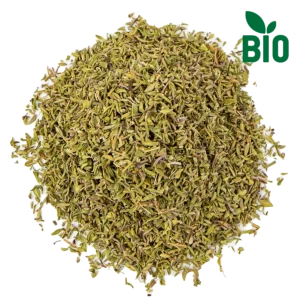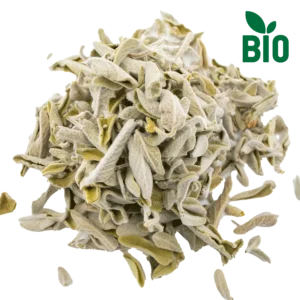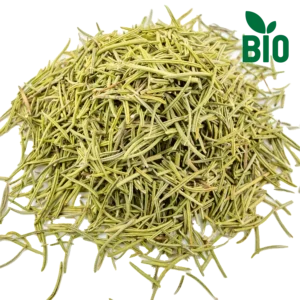In this article we will explore the basics of harvesting thyme, see how we can use its leaves, learn about thyme as a tea, spice and essential oil. In our previous article you can see information about the properties of this unique herb.
Greek thyme, also known as thymos, grows in the mountainous areas of our country. In fact, there are over 120 species of thyme, twenty-three of which grow in Greece. Wild thyme thrives in the Mediterranean climate, and its abundance in the region has given it a prominent role in Greek cuisine.

With its small green leaves, woody stem, and refreshing scent, it is an herb that easily stands out in nature!
An evergreen shrub with soft purple flowers, it is a treasure for the kitchen and organized growing. The best time to harvest is during the flowering season, with the best yield being achieved between the second and sixth year of growth. In the case of organized crops, plantings are renewed every six years to maintain quality, but the plant can live much longer in the garden with minimal care, offering its leaves for use throughout the year.
Thyme, a woody plant with taste and healing benefits, offers flexibility in its use. Leaves and flowers enhance the flavour of dishes, while whole sprigs can be added for flavour and easily removed. Separating the leaves from the branches is simple using a sieve, and pure leaves are also available for even greater convenience. Thyme’s widespread use and benefits make this herb indispensable in cooking and beyond.
Thyme, this aromatic gift of nature, is known for its healing properties, especially when consumed as a tea. Rich in natural antioxidants, thyme helps fight free radicals, providing a natural respiratory tonic. Particularly beneficial to the respiratory system, thyme helps to relieve coughs and ease cold symptoms. Its antimicrobial action helps fight microorganisms that cause respiratory infections, making it an ideal beverage for boosting respiratory health. Enjoy a cup of thyme tea for an easy and natural way to protect your respiratory system

Sage and thyme may seem like similar herbs at first. This is because both have a slight minty taste. However, both offer different flavor profiles – thyme is more lemony, while sage is more musky. Because of these similarities and differences, they make a nice tea combination!
Plus, by combining sage and thyme in tea, you get both the benefits of sage and thyme. So, we’re a double winner! Like thyme, sage has anti-inflammatory properties and also helps improve mood! Sage has many other benefits. Some of them are improving blood sugar control and promoting brain health.

The slightly woody, piney flavor of rosemary makes it a nice complement to thyme in a cup of tea. In addition, it enhances some of the health benefits of thyme tea. It also has anti-inflammatory, antibacterial and tonic properties! In addition, rosemary helps to improve blood sugar control and improve memory, so here’s a very healthy herbal combination for your tea!

As we have discussed in this article, thyme has an earthy and slightly lemony taste. It is widely used in soups, roasted vegetables, pasta, sauces, pizzas – and the list doesn’t stop there! Thyme can be used fresh, as a “sprig” where the stem and leaves are kept together. It can also be used dried and sprinkled in a variety of dishes.
Dried thyme is very tasty and can usually be used as a substitute for fresh thyme if needed. Make sure that the amount of dried thyme you use is about one-third the amount of fresh thyme. The flavor of dried thyme is much stronger than fresh thyme!
Thyme is a very popular seasoning and pairs well with meat, tomatoes and beans. It goes well with Mediterranean cooking, especially for lamb dishes. It is also an essential element of the French ‘Bouquet Garnis’ and ‘Herbs de Provence’. There they are regularly used to flavour meats, stews and soups.
Although oregano and thyme have different flavor profiles, they combine wonderfully! You can often mix the two herbs together in a recipe. Oregano gives the dish an earthy, warm and robust taste. On the other hand, thyme gives the dish a lemony, minty and slightly peppery flavor. So, their flavours complement each other perfectly!
Because thyme essential oil has a highly concentrated form of thyme, it has all its benefits and more ! So among the properties are included: anti-inflammatory, antibacterial and antifungal.
In addition, thyme essential oil is regularly included in commercial mouthwashes because of its benefits for oral hygiene. While it has also been shown to help in hair loss treatments.12
Finally, we would like to share some tips for storing thyme.
Fresh thyme should be completely dry before storing and wrapped lightly in paper towels. You can then store it in the refrigerator. Dried thyme should be stored in an airtight container away from heat and light.
If we have inspired you and you want to include more thyme in your diet, you can visit our product page. Here you will find Dried Greek Thyme! We hope you enjoy its delicious taste in your next meal!
FAQs:
Thyme tea is generally safe for the majority of people, but there is a possibility of allergic reactions in sensitive individuals. It can also interact with certain medications and is not recommended for pregnant or breastfeeding women without medical advice.
Thyme tea is a popular beverage made from the leaves of the thyme plant, which is known for its antiseptic, antimicrobial and bronchodilator properties. It is often used in traditional medicine to relieve symptoms of colds, coughs and respiratory inflammation.
[12] https://pubmed.ncbi.nlm.nih.gov/9828867/
Subscribe to our newsletter to stay informed about herbs, recipes, exclusive offers, and receive a 15% discount on your first order!

Ευχαριστούμε πολύ τα παρακάτω websites για τη συνδρομή τους σε επιπρόσθετο, ελεύθερο φωτογραφικό υλικό (free stock) που χρησιμοποιείται στην ιστοσελίδα μας:
Pixabay.com
Pexels.com
Unsplash.com
Freepik.com
Canva.com
Adobe.com
Σταύρος Δεβεράκης (Φωτογράφος)
Many thanks to the following websites for their subscription to additional, free stock photography used on our website:
Pixabay.com
Pexels.com
Unsplash.com
Freepik.com
Canva.com
Adobe.com
Stavros Deverakis (Photographer)